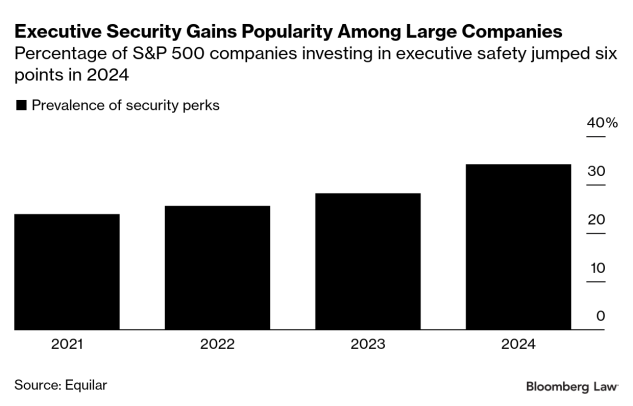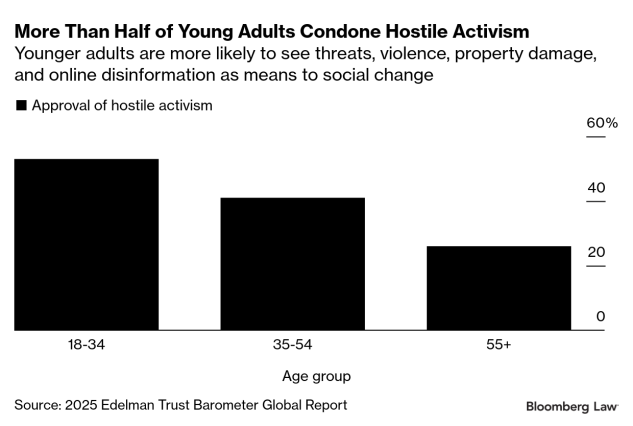- Mention of CEO security in corporate filings rises to 34%
- Acceptance of hostile activism stokes concerns among security pros
Companies are spending record amounts to keep their top officers physically safe, reflecting an era of heightened security concerns.
More than 34% of S&P 500 companies mentioned bodyguards, home security, safety conscious transportation, and other personal security measures as executive perks in their 2025 proxy filings—a 21% jump from a year before. The data, from executive intelligence firm Equilar, runs through the end of April.
The fatal December shooting of UnitedHealthcare CEO Brian Thompson helped drive increased security spending. But the trend predated that incident, with political division, economic strife, and a wider acceptance of violence as a means to social change all contributing, some executive security professionals say.
Executives in industries like health care and defense may have greater risk of experiencing retaliation from disgruntled stakeholders. But nearly every industry is on edge as societal tension shows no sign of slowing, said Matthew Dumpert, managing director at risk management firm Kroll.
“The new business as usual is that executives are at risk because of the product or service their company sells,” Dumpert said. As a result, companies are confronting gaps in security services and scrambling to correct years of under-investment, he said.
All Sectors Concerned
Lisa Woods, executive director of the Raj & Kamla Gupta Governance Institute at Drexel University, says she doesn’t see security spending coming down anytime soon. In fact, it’s likely to jump as companies plan for the coming year during an increasingly polarized political environment, said Amit Batish, Equilar’s senior content director.
Business at global security and risk management firm the Chertoff Group has more than doubled since Hamas’ 2023 attack on Israel, the attempted assassination of Donald Trump in Butler, Pennsylvania, and Thompson’s December killing, said Ben Joelson, who heads the firm’s security risk and resilience practice.
While no industry is completely insulated, companies closest to controversial issues are more likely to increase security spending, said Jordan Strauss, a former White House and Justice Department national security official who teaches national security law at Drexel University.
Defense company
Technology company
For some, offering security services was a new move altogether: more than a dozen large-cap companies said they started providing executive protection last year when they didn’t before, according to Equilar. One was healthcare company
Aside from companies at the center of heated news debates, those with well-known, public-facing founders are also taking on risk, Strauss said.
Looking Closer
Security measures can help leaders feel safer, but they may not address the root problem.
Fear that leaders lie to the public is at an all-time high, and 53% of young adults globally see hostile activism as a viable means to drive change, according to the 2025 Edelman Trust Barometer, a survey that measures public trust in government, business, and more.
“Violence is being normalized—it’s being celebrated, and it’s being almost equated to martyrdom,” Dumpert said.
If corporations want to prevent attacks, monitoring company sentiment online is crucial, Woods said. In fact, companies that would normally outsource their security measures are starting to hire new in-house positions to monitor threats, geopolitical strife, and more, Dumpert said.
“When you’re relying on physical security, it’s too late,” Drexel’s Woods said.
Companies and executives should also be careful about flaunting wealth, booking hotels, and traveling in general, Strauss said.
“The roots of this problem aren’t really problems that can be addressed by just adding security,” especially since seeing a group of armed people can increase feelings of alienation in both employees and consumers, he said.
Executive compensation has grown along with the risk of leading a company. But with CEO departures reaching new highs, it’s unclear how safety fears could impact recruitment and retention.
At the very least, executives are checking whether their compensation packages and perks have built-in security, Joelson of the Chertoff Group said.
“There is sort of this shifting duty of care that employers feel toward executives,” he added.
To contact the reporter on this story:
To contact the editors responsible for this story:
Learn more about Bloomberg Law or Log In to keep reading:
See Breaking News in Context
Bloomberg Law provides trusted coverage of current events enhanced with legal analysis.
Already a subscriber?
Log in to keep reading or access research tools and resources.


